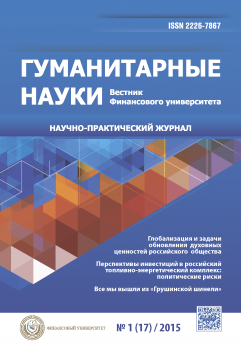This article describes the topical problems of European integration in their relationship with the theoretical and historical contradictions which arose at the dawn of European integration. The following integration theories are observed: functionalism, institutionalism and federalism, as well as more recent neofunctionalism and postneofunktsionalizm. Different concepts of European integration are considered. In addition the most important problems and contradictions, which the European Union has to handle are distinguished. The results of the Brexit voting held on 23 June 2016 are analyzed. The decision of the UK people to withdraw from the EU is far from unanimous, and from a legal point of view is not definitive. At the same time, the British and European officials perceive Brexit as fait accompli. Moreover, the exit procedure is being encouraged from the European side. An analysis of the possible consequences of this event shows that disintegration will not pass without serious consequences for any of the stakeholders. In addition, it can be expected that the EU will undertake a number of serious reforms.
European Union (EU), European integration, disintegration, Brexit
Региональная интеграция сегодня представляет собой не тренд или тенденцию, а способ существования и сосуществования государств в мире. Флагманом региональной интеграции, бесспорно, является Европейский Союз (ЕС, Евросоюз). Более того, ЕС, благодаря гибкой системе форматов сотрудничества с внерегиональными партнерами, мог бы претендовать на роль очага глобальной интеграции. У ЕС есть свои критики и свои сторонники. Как при формировании ЕС было множество различных точек зрения по поводу того, каким образом и на основе чего должен строиться европейский блок, так и теперь есть множество различных взглядов на то, в каком направлении ЕС следует развиваться, и стоит ли. Особую остроту подобным обсуждениям придают результаты недавнего референдума в Великобритании.
Европейская интеграция столкнулась в последние годы с существенными трудностями, однако «европейский колосс» все еще крепко «стоит на ногах». Ввиду столь стремительно развивающихся событий представляется интересным заглянуть в прошлое, на то, как возник ЕС, к чему он шел, к чему в итоге приходит в наши дни.
Различные теории интеграции ЕС
Различные теории политической интеграции стали зарождаться в 1950–1960-е гг. Первая группа – это наднациональные теории интеграции. Адепты данной теории полагали, что национальные государства, несмотря на существенную власть и ресурсы, теряют способность эффективно защищать своих граждан [1]. В связи с этим государства должны уступить место образованиям наднациональной интеграции. Наднациональные теории представлены двумя основными концепциями: федерализм и функционализм, на их основе позднее была разработана концепция неофункционализма.
1. Suslova T.L. Dinamika evropeyskoy integratsii: teoreticheskie zakonomernosti, politicheskie tendentsii i rezul’taty institutsionalizatsii. Kand. Diss [Dynamics of European integration: theoretical laws, political trends and the results of institutionalization. Kand. Diss]. Nizhniy Novgorod, 2005. 292 p.
2. Egorov A.V. Pravovaya integratsiya i ee soderzhanie [Legal integration and its contents]. Gosudarstvo i pravo [State and Law]. 2004, I. 6.
3. Mitrany D. A working peace system: An Argument for the Functional Development of International Organization. - Chicago, 1966.
4. Safronova O.V. Funktsionalizm i neofunktsionalizm: ekonomicheskie, sotsial’nye i politicheskie protsessy regional’noy integratsii. [Functionalism and neofunctionalism: economic, social and political processes of regional integration]. Region v sostave federatsii. Politika, ekonomika, pravo [Region as part of the federation. Politics, economics, law]. Nizhniy Novgorod, 1999, p. 103.
5. European Integration: Theories and Approaches. Op. cit. - P. 28.
6. Linkage Politics: Essays in Convergence of National and International Politics // Ed. by J. Rosenau. N.Y.: Free Press, 1969
7. Transnational Relations and World Politics / Ed. by R. Keohane, J. Nye. Cambridge: Harvard University Press, 1972.
8. Kaveshnikov N.Yu. Transformatsiya institutsional’noy struktury Evropeyskogo Soyuza (1992-2005). Kand. Diss [The transformation of the European Union’s institutional framework (1992-2005). Kand. Diss]. Moscow, 2006.
9. Goncharuk N.S. Formirovanie nadnatsional’noy identichnosti v usloviyakh uglubleniya sotsial’no- politicheskikh integratsionnykh protsessov v ES. Kand. Diss [Formation of a supranational identity in the conditions of deepening social and political integration in the EU. Kand. Diss]. Orel, 2009.
10. Vaynshteyn G.I. Evropeyskaya identichnost’: zhelaemoe i real’noe [European Identity: the desired and actual]. Polis [Polis]. 2009, I. 4.
11. Sravnitel’nyy analiz politicheskikh sistem Evropy [Comparative analysis of political systems in Europe]. Voronezh, 2006.
12. Rowena Mason. 10 key lessons from the European election results // The Guardian, http://www.theguardian.com/politics/2014/may/26/10-key-lessons-european-election-results
13. Oliver Wright. David Cameron assures ‘good progress’ at EU talks despite fellow leaders calling migrant benefit reforms ‘unworkable’ // Independent, http://www.independent.co.uk/news/world/europe/david-cameron-left-isolated-as-eu-leaders-call-migrant-benefit-reforms-unworkable-a6777666.html
14. Glukhodedov A. Devid Kemeron podast v otstavku posle referenduma po Brexit [David Cameron to resign after the referendum on Brexit]. Izvestiya [Izvestia]. Avaiable at: http://izvestia.ru/news/619362#ixzz4Ctu1iYJ3
15. Evrokomissar ot Velikobritanii Dzhonatan Khill podal v otstavku [The European Commissioner from Britain Jonathan Hill resigned]. TASS [TASS]. Available at: http://tass.ru/mezhdunarodnaya-panorama/3401065
16. MEPs call for swift Brexit to end uncertainty and for deep EU reform // Ofitsial’nyy sayt Evroparlamenta, http://www.europarl.europa.eu/news/en/news-room/20160628IPR34006/MEPs-call-for-swift-Brexit-to-end-uncertainty-and-for-deep-EU-reform





